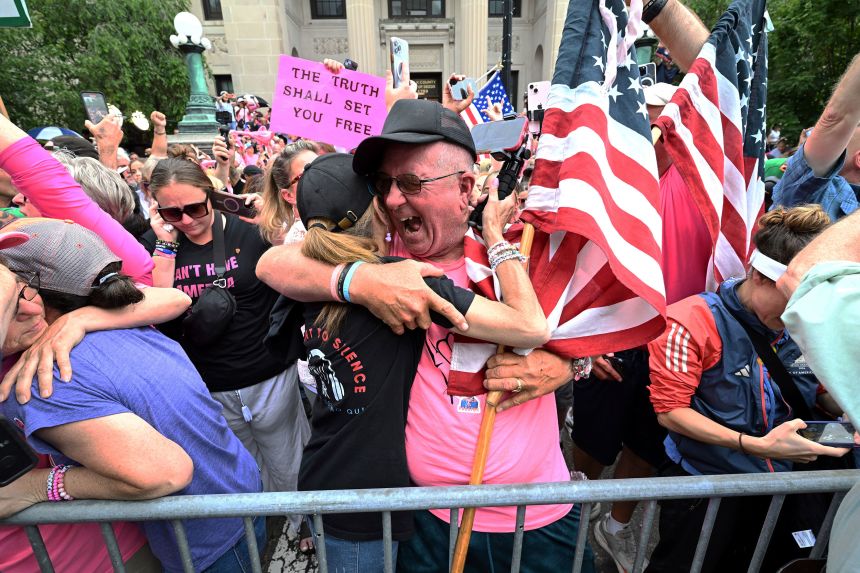Dedham, Massachusetts
—
Karen Read was acquitted in the killing of her Boston police officer boyfriend John O’Keefe on Wednesday, vindicating a defendant who had claimed to have been the victim of a sweeping cover-up.
Though she was found guilty of drunk driving, Read’s acquittal on charges of second-degree murder and leaving the scene of an accident resulting in death was undoubtedly a victory: As a first-time offender of operating a vehicle under the influence, Read will serve just one year of probation, Judge Beverly Cannone ruled.
She had faced up to life in prison if convicted of second-degree murder.
The verdict Wednesday marks a stunning conclusion to a long and divisive case after nearly eight weeks of testimony that featured a combined 49 witnesses from the prosecution and the defense – and comes less than a year after jurors in Read’s first trial failed to reach a unanimous verdict, forcing the judge to declare a mistrial.
In both cases, prosecutors had accused Read of hitting O’Keefe with her SUV during a night out drinking with friends, alleging she struck O’Keefe while driving in reverse and left him to die outside a home in Canton, Massachusetts, as their romance deteriorated.
Read claimed innocence, alleging off-duty law enforcement members inside that home were responsible for O’Keefe’s death and that they conspired to frame her. At trial, her defense focused on painting the police investigation as biased and flawed, and offering jurors alternative theories for what, other than Read’s SUV, might have killed O’Keefe.
The sharply divergent theories on each side split these suburbs outside Boston for the better part of three years.
On one side, Read’s supporters donned pink, championed her claims of innocence and echoed allegations of police corruption. They congregated in recent days outside the courthouse in Dedham, holding their hands up in the American Sign Language gesture for “I love you,” rather than loudly chanting “Free Karen Read.”
Meanwhile, O’Keefe’s family and close friends, much more subdued, wore blue. But CNN did not see them outside the courthouse among Read’s advocates, only glimpsing them as they walked into and out of the courthouse, escorted by law enforcement.
Read’s supporters erupted in cheers outside the courthouse as the verdict was read, loud enough to be heard inside the courtroom. Then, they erupted in song, singing “God Bless America.”

Read soon emerged from the courthouse to the sea of pink-wearing devotees and confetti, thanking them for their support.
“I could not be standing here without these amazing supporters who have supported me and my team financially and, more importantly, emotionally for almost four years,” she said.
“No one has fought harder for justice for John O’Keefe than I have. Than I have, and my team,” she added.
The jury deliberated for about 21 hours over four days.
The case centers on a window of time that began late January 28, 2022, and stretched into the early morning hours of the following day.
That evening, Read and O’Keefe went out with friends to two bars in Canton – a suburb about 20 miles south of Boston – ahead of a historic snowstorm. Prosecutors presented text messages in an effort to illustrate the couple, who began dating during the Covid-19 pandemic, were at odds that day.
The party eventually moved to a home at 34 Fairview Road. Read, who was driving, has said she dropped O’Keefe off, but witnesses who testified for the prosecution said he never came inside.
At trial, prosecutors – led by special prosecutor Hank Brennan – argued that after O’Keefe exited the vehicle, Read put her SUV in reverse and pressed on the gas at about 75% of the throttle. They alleged Read struck O’Keefe at a speed of about 24 miles per hour, shattering her SUV’s taillight, sending the victim to the ground – resulting in blunt force trauma to his head that incapacitated him, leading to his death.
When Read returned to the scene the next morning with two other women, they found O’Keefe lying in the snow near a flagpole in the yard of the home. When a paramedic who responded to treat O’Keefe asked what happened, Read responded, “I hit him, I hit him, I hit him,” according to testimony by prosecution witnesses.
Read’s defense said a collision never happened. Experts who testified on Read’s behalf said the damage to her vehicle were inconsistent with O’Keefe’s injuries, and one witness testified the cuts and scratches on his arm were caused by a dog.
The defense did not argue a third-party culprit theory, which would have seen them try to convince jurors that other individuals were responsible for O’Keefe’s death. But they appeared to try to raise questions in jurors’ minds about whether people inside 34 Fairview Road that evening had the motive or means to cause O’Keefe’s injuries.
The entirety of their case was much broader, seeking to undermine the investigation by police. In particular, the defense pointed to text messages sent by Michael Proctor, the former Massachusetts State Police trooper who led the investigation.
Evidence presented at trial showed Proctor had sent sexist and offensive text messages about Read, which her attorneys used to argue the investigation had been prejudiced against her from the start. Proctor apologized for the text messages on the stand in the first trial; the state police dishonorably discharged him from the agency in March. He was not called to testify in the second trial.
Prosecutors tried to combat this theory, presenting witnesses who argued that, despite the investigator’s comments, he did not tamper with evidence or work to frame Read.
Read herself did not take the stand to testify, though she appeared to toy with the idea as prosecutors played clip after clip taken from her media interviews in an effort to use her words against her by highlighting inconsistencies in her statements.
In some, Read appeared to entertain the possibility her vehicle had made contact with O’Keefe. But she rejected the idea in others, including from a documentary series produced by Investigation Discovery (CNN and Investigation Discovery share the same parent company, Warner Bros. Discovery).
“I did not drive my car into John,” she said. “Didn’t reverse it. Did not hit John with my car. There is zero chance this is an accident. There is zero chance John was hit by a vehicle.”
This story has been updated with additional details.
CNN’s Jean Casarez and Sarah Boxer reported from Dedham, Massachusetts, while Dakin Andone reported and wrote from New York. CNN’s Braden Walker contributed to this report.

